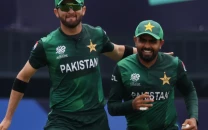Controversy par excellence
While the political input leads to compromise, the extra-parliamentary input breeds controversy.

The writer is a professor at the Department of Humanities and Social Sciences at LUMS
The ‘cover’ of religion for crimes carried out by militant groups, such as murder through suicide bombing or targeted killing, abduction for ransom and bank robbery has utterly confused even the ‘modern’ people in and outside politics. However, the ‘mass public’ is able to see through the ideology-laden discourse of the right wingers. It finds thousands of dead bodies, wounded persons and traumatised families crying for security against terror. It condemns the medieval agenda of the militants in terms of destroying girls’ schools and pushing women back to the medieval ages. The militants’ deadly attacks on army personnel, ranging from generals to jawans, and on military installations across the country, have transformed their image from allies across the northern border to a cancer of the state.
Controversy about militants has led to controversy about Imran Khan, who has staked his political career on the issue of stopping the American drone attacks on Fata and now Khyber-Pakhtunkhwa (K-P), and blocking the Nato supplies to Afghanistan. In a speech in Oxford as far back as in 1998, he had declared the Afghan Taliban’s rule to be the symbol of Islam’s renaissance. He found them as the greatest principle of justice and political stability. Obsession with them for a decade and half provides the frontispiece of Imran Khan’s political vision for Pakistan.
Controversy within the PTI is simmering down below. The party’s backbone, comprising the urban-based professional middle class, including a large spectrum of educated women, is not known for tolerance — much less affection — for terrorists. As a typical propertied class, it craves for security and stability. None among the top layer of the PTI leadership has been known for openly supporting the militants’ cause during their respective party careers in the last decade. However, they are constrained to defend their tempestuous leader on this issue on various TV channels. They continue to fear that the latter’s struggle to stay afloat after the loss of the May 2013 elections at the national level by taking anti-Americanism to new heights has put the party on a suicidal path.
Anti-Americanism is the pivot of the discourse about the controversial war on terror among the militants and political groups on the right. Traditionally, hatred for America would have been analysed with reference to the following questions: is there a history of war between Pakistan and the US? Does the US have an ongoing conflict with Pakistan, such as the nuclear issue with Iran, the brutal suppression of opposition and use of chemical weapons in Syria, or brandishing of nuclear arms in North Korea? Has Pakistan found a new anchor on the world stage, either Russia or the EU or perhaps Japan? How damaging is the American connection for Pakistan’s economy? If not, did the establishment go too far in risking a drawdown of its strategic ties with the US in the aftermath of the Abbottabad Operation and then the Salala incident? Will there be any clearing of the mist on the horizon of Pakistan-US relations any time soon?
The discourse of anti-Americanism, led by the Pakistan variety of ‘neo-cons’, such as Imran Khan, looks at those disagreeing with them on this and related issues as being anti-national and un-patriotic. They often put Prime Minister Nawaz Sharif in the dock for not fulfilling various promises attributed to him for stopping the drone attacks and safeguarding national sovereignty. The conservative/apologist section of the media has little tolerance for any opinion other than its dichotomous world view based on hatred against the West.
At home, the PTI’s sit-ins and rallies belong to the category of a solo flight because no other parliamentary group, except the JI, has come out strongly in its favour. Recently, Tahirul Qadri again struggled to make news headlines, but remained confined to a marginal role in the political landscape. Controversy about the JI’s leader, Syed Munawwar Hasan, considering the martyrdom of Pakistan’s men in uniform an open question was followed by the PTI holding the army operation responsible for taking East Pakistan away from the country.
Controversy about General (retd) Pervez Musharraf’s trial points to the tense civil-military relations. Politicians find him a fugitive from law insofar as he continues to shun his legal duty of appearing in court. His heart attack also became controversial as did its aftermath. The PPP’s young chairperson finds Musharraf a coward, who does not want to face a court of law, whereas the PPP leadership braved this ordeal for two generations.
On his part, Musharraf has evolved a strategy of invoking the army’s support for himself. His personal predicament, due to his alleged violation of the Constitution by declaring emergency in 2007, has led him to provoke a clash of state institutions that remains hugely disproportionate to a common citizen’s right to protection of law. It is clear that the ex-COAS would not shy away from making the issue of his culpability a larger-than-size issue.
Interestingly, the MQM’s Altaf Hussain has come out strongly in support of Musharraf, the only major party and party leader to do so. The MQM is an ally of neither the PPP nor the PML-N. It still does not know the fate of local bodies elections even after nullification of the latest amendments to the relevant law by the Sindh High Court. Local bodies elections elsewhere remain controversial, marred by the issue of delimitation of constituencies in Punjab and remaining the relative non-starter in K-P.
Controversy reflects a loss of forum for conflict-resolution, such as parliament. The overreach of the courts has had the effect of pushing one party out of negotiations with the other, and thus stopping the legislative route to conflict-resolution. While the political input leads to compromise, the extra-parliamentary input breeds controversy. The latter includes such extra-systemic forces as the militants or their apologists/backers at one end and maverick politicians, the army, the judiciary as well as the increasingly powerful but self-destructive discourse about fighting the ghosts in the dark, at the other end.
Published in The Express Tribune, January 11th, 2014.
Like Opinion & Editorial on Facebook, follow @ETOpEd on Twitter to receive all updates on all our daily pieces.















COMMENTS
Comments are moderated and generally will be posted if they are on-topic and not abusive.
For more information, please see our Comments FAQ